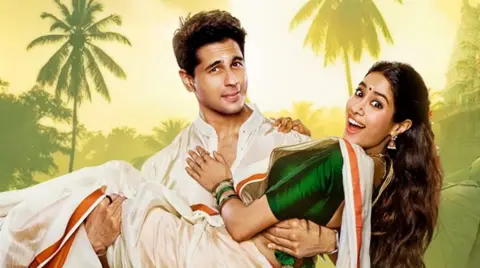A new Bollywood film has reignited an age-old conversation around how India's largest and most influential film industry represents characters from non-Hindi speaking states.
Param Sundari, a romcom starring Sidharth Malhotra and Janhvi Kapoor, is a love story between a woman from the southern state of Kerala and a man from Delhi in northern India.
Param and Sundari first butt heads and then fall in love, successfully overcoming the cultural differences between them.
The idea isn't new: Bollywood has long explored north-south cultural clashes through romcoms, and in a multilingual country, well-executed cross-cultural romances can be a hit.
However, in this case, critics and social media users from Kerala and beyond have called out the film for its caricatured depiction of the state, particularly Sundari.
Played by Kapoor, Sundari often wears a string of jasmine flowers in her hair, can communicate with elephants and climbs coconut trees as a hobby - all stereotypical traits often associated with Kerala. Though she's lived there most of her life, her Malayalam is atrocious.
The criticism began as soon as the film's trailer was shared, with many puzzling over Sundari seeming to mispronounce her own name. This invited comparison with another much-derided character, Shalini Unnikrishnan (played by Adah Sharma), from the controversial film The Kerala Story.
In both films, the heroines, despite living in Kerala, speak Hindi and struggle with fluent Malayalam.
A few minutes into Param Sundari, when Param's friend learns that they will be visiting a village in Kerala called Nangiarkulangara, he exaggeratedly pronounces the name and asks, Where is that? Africa? combining stereotypes and casual racism into one question.
Once in Kerala, the film swiftly presents many touristic features - from backwaters and coconut trees to elephants and the Onam festival, leading some reviewers to describe it as a glorified advertisement for Kerala tourism.
For many viewers, cultural inauthenticity is not a dealbreaker.
Rajiv, from northern Bihar, remarked that he saw Param Sundari as a fun glimpse into an unfamiliar culture, arguing that while portrayals may not be true to life, artistic freedom enhances entertainment.
On the other hand, others lamented the film's lack of genuine educational value, with critic Sowmya Rajendran describing it as generic, exhausting and offensive.
Cinematic critiques of cultural representation span the industry, presenting an ongoing challenge for filmmakers as audience values shift and diversifying platforms rise.
As Bollywood battles these ongoing debates, films like Param Sundari must navigate a delicate landscape of societal expectations regarding authenticity and representation.




















